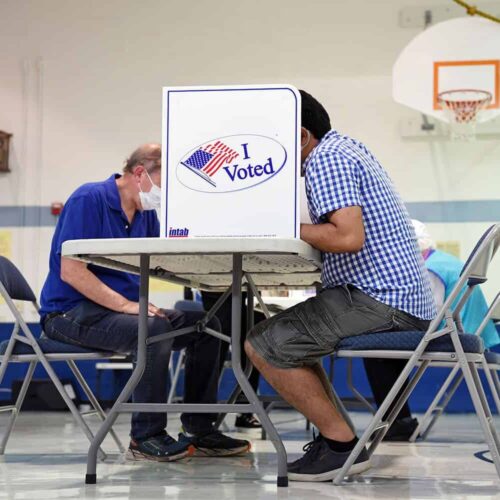Introduction
Legislators around the country have overhauled laws governing access to voting in the wake of the 2020 election, with states increasingly diverging on how difficult it should be to cast a ballot.
About a quarter of Americans live in states trying to expand voter access and roughly an equal number live in states making it more restrictive, estimated Liz Avore, vice president of law and policy at the nonpartisan Voting Rights Lab, a nonprofit that advocates for voting rights and tracks changes to state laws.
“We’re seeing a fault line develop and deepen across the country,” she said.
That means that “more and more, we are seeing that the right to vote is dependent on what state someone happens to live in,” said Eliza Sweren-Becker, a lawyer at the nonprofit Brennan Center for Justice who focuses on voting rights and elections. “This wave of restrictions is really historic.”
In the wake of the 2020 election, former President Donald Trump has repeatedly made false allegations of irregularities or fraud, though Trump’s own attorney general, federal judges, experts and election officials have all said there is no evidence of any fraud affecting the results.
Republican lawmakers around the country have pushed for voting restrictions following historic levels of turnout and Democratic victories last November. They argue it’s necessary to shore up voters’ faith in the integrity of elections, faith that has been undermined by Trump’s and Republicans’ advancement of conspiracy theories and false allegations of fraud. And in the wake of a 2013 U.S. Supreme Court decision, Shelby County v. Holder, jurisdictions with a history of racial discrimination in voting no longer have to seek permission from the Department of Justice to change voting policies.
The new laws still must survive court challenges. In June, the Justice Department sued the state of Georgia over its wide-ranging new voting law, which put new limitations on absentee voting, revised identification requirements for it, and prohibited handing out food and water to voters standing in line, among other things. At a press conference announcing the lawsuit, Attorney General Merrick Garland said the law was “enacted with the purpose of denying or abridging the right of Black Georgians to vote on account of their race or color, in violation of Section 2 of the Voting Rights Act.”
The pandemic, meanwhile, drove other changes to how people voted last year, many allowed on a temporary or emergency basis. The 2020 election saw record turnout and a boom in voting by mail, and some states have permanently expanded access to alternate methods of voting after finding that voters liked them.
More changes could be coming. A coalition of voting rights groups havepushed for federal legislation that would roll back some provisions in newly passed state laws and establish some national standards for voting, including access to mail ballots, though it faces difficult odds in a closely divided U.S. Senate.
A dizzying array of changes
The Voting Rights Lab had tracked more than 2,600 election bills around the country as of early September, and 45 states had passed 221 bills into law, the organization said. It characterized 41 of the new laws as “anti-voter,” and 102 as “pro-voter.”
The impact of the remaining legislation is either mixed or unclear, and some bills that fall clearly into one category have provisions that fall into another.
Tracking the changes can be dizzying, and advocates warn educating voters about them will be essential. The Voting Rights Lab found legislation in 27 states, including Connecticut and Nevada, expanded or improved mail voting. In 13 states, new laws restricted it. Some states, including Texas, passed provisions falling into both categories.
The new restrictions vary, but they have passed even in states where voting by mail has long been a popular way to cast a ballot. In Arizona, for example, voters on the state’s permanent early voting list automatically received a mail ballot for elections. Now, a new law will remove voters from that list if they do not cast a mail ballot over two consecutive election cycles or respond to a notice within 90 days, though the voter will still be registered.
Meanwhile, laws passed in Arkansas, Florida, Georgia, Iowa and Texas prohibit the use of drop boxes for absentee ballots or create new restrictions that make them less accessible to voters, according to the Voting Rights Lab.
Audrey Kline, national policy director for the National Vote at Home Institute, said she wishes lawmakers would make sure what they’re proposing actually boosts election security without adding obstacles for voters. For example, she pointed to a Colorado requirement for 24-hour cameras at drop boxes. “That is a way to sort of get to the perceived problem without putting any kind of barrier in front of the voter,” she said.
And in states where voting by mail is already popular, Kline said lawmakers attempting to restrict it are likely to see their efforts affect their own party’s voters as well. “There are a lot of Republicans that use this, so to think that creating restrictions is only going to affect the opposite political party is folly, in my opinion,” she said.
In terms of provisions with support in both red and blue states, 10 states, including California, North Dakota, Texas and Virginia, have created or strengthened so-called “cure” processes, procedures to allow voters to address minor problems that could keep their mail ballots from being counted, according to the Voting Rights Lab. And there’s been little backlash against in-person early voting: Kentucky, a red state with a Democratic governor, passed a bill making it permanent with bipartisan support earlier this year.
Many state legislatures have concluded their work for the year, but voting rights advocates are still watching proposed legislation in Ohio, Pennsylvania and North Carolina, among others, with concern.
In Michigan, where Gov. Gretchen Whitmer, a Democrat, had vowed to veto Republican-backed legislation that would add barriers for voters, supporters of the measures have turned to a petition process that would allow the changes to become law without her signature. Among other things, the proposals would make voter identification requirements stricter and prohibit election officials from sending absentee ballot applications to voters without a specific request, something Michigan Secretary of State Jocelyn Benson, a Democrat, did in 2020.
Local election officials, meanwhile, must adapt to the constantly changing requirements.
Isabel Longoria, the elections administrator in Harris County, Texas, which includes Houston, said local election officials there will continue to innovate, even after a new state law blocked some methods of voting the county pioneered during the pandemic.But “it’s almost like playing the smash the gopher with a hammer,” Longoria said, speaking at an event last week sponsored by the Fair Elections and Free Speech Center at the University of California Irvine School of Law. “OK, so you stopped drive-through voting, an incredibly popular and accessible way of voting. We have other things that we’re working on.”
Carrie Levine is a senior reporter at the Center for Public Integrity. She can be reached at clevine@publicintegrity.org. Follow her on Twitter @levinecarrie.
Read more in Inside Public Integrity
Cheated at Work
Wage theft hits immigrants — hard
Immigrant workers performing low-paying jobs are among the most victimized by businesses that employ them.
Cheated at Work
Cheating workers on the U.S.-Mexico border
U.S. Department of Labor officials have unveiled a pattern used by American companies to underpay Mexican workers.




Join the conversation
Show Comments